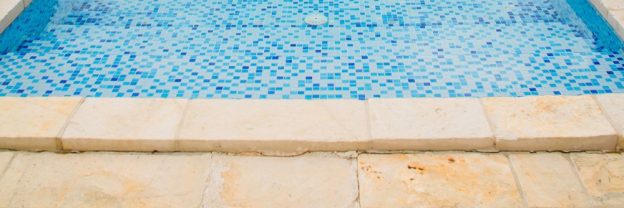Natural stone adds timeless beauty and value to any pool area. From warm-toned sandstone to elegant travertine, stone surrounds are a popular choice for homeowners who want a premium finish that complements the outdoors. But as stunning as natural stone is, it’s also porous—and that means it needs protection.
Sealing your stone pool surrounds isn’t just a recommendation—it’s essential maintenance. But how often should you do it? The answer depends on the type of stone, how exposed it is to the elements, and how well the area is maintained. Let’s break it down.
Why Sealing Natural Stone Matters
Sealing your stone pool surround acts as a protective barrier against:
- Algae, mould, and black staining
- Garden waste, bird droppings, and leaf tannins
- Salt and water damage from pool splash
- UV-related fading or weathering
- Permanent staining caused by absorption
It also enhances the stone’s natural colour and makes it easier to clean in future.
Recommended Sealing Frequency by Stone Type
| Stone Type | Sealing Frequency | Notes |
| Sandstone | Every 2–3 years | Highly porous and stain-prone; benefits most from regular sealing |
| Travertine | Every 3–5 years | Moderately porous; needs protection from pool chemicals |
| Marble | Every 2–3 years | Sensitive to acid; sealing reduces etching risk |
| Granite | Every 5–7 years | Dense and durable; less frequent sealing needed |
| Limestone | Every 2–3 years | Vulnerable to weather and salt exposure |
| Slate | Every 3–4 years | Can become flaky or faded without sealing |
If your pool surround is exposed to a lot of sun, shade, trees, or high foot traffic, you might need to seal more often.
Signs It’s Time to Reseal
Not sure if your stone needs sealing? Watch out for these signs:
- Water no longer beads on the surface—it soaks in instead.
- Stains or algae patches appear more frequently.
- The stone looks dull, dry, or patchy in colour.
- You notice efflorescence (white salt deposits).
- The surface feels rougher or shows signs of erosion.
What Happens If You Don’t Seal Your Stone?
Unsealed stone is vulnerable to permanent damage. In the words of the team at Marble Everlast, “If you don’t seal it after cleaning, you’ll likely see the same problems again in six months—only worse.”
Without sealing, dirt, garden debris, and pool chemicals can soak deep into the pores of the stone, making future cleans less effective and increasing the risk of stains that even professional cleaning can’t remove.
DIY vs Professional Sealing
You might be tempted to buy a bottle of sealer and do it yourself—but keep in mind:
- Not all sealers are equal—the wrong one can darken the stone or trap moisture.
- Prep matters—professional cleaning removes deep stains and opens the pores for maximum sealer penetration.
- Application takes experience—too little and you waste your effort, too much and it leaves a sticky residue.
Professionals like Marble Everlast also offer enhancing sealers that restore faded colour and create a water-beading effect for added visual appeal.
Pool Surround Sealing: Our Process
At Marble Everlast, sealing is never a one-size-fits-all job. Our typical pool surround treatment includes:
- Assessment of your stone’s condition and past sealing.
- Deep machine cleaning to remove algae, stains, and embedded grime.
- Gentle pressure washing, with care taken not to damage joints or fragile stone.
- Neutralising rinse using a pool-safe, eco-friendly bicarbonate solution.
- Application of 2–3 coats of premium-grade sealer, tailored to your stone type and finish.
We also provide DIY-friendly maintenance soap that both cleans and reseals in one step—ideal for monthly upkeep between professional cleans.
Sealing natural stone around pools is a must
Sealing natural stone around pools is a must if you want to protect your investment and keep your outdoor area looking stunning year-round. Whether you’ve just installed new pavers or are reviving a 15-year-old pool surround, a proper sealing routine will make all the difference.
Not sure when your stone was last sealed?
Contact Marble Everlast today on 0401 508 938 for a free inspection and expert advice on protecting your pool surrounds for years to come.




